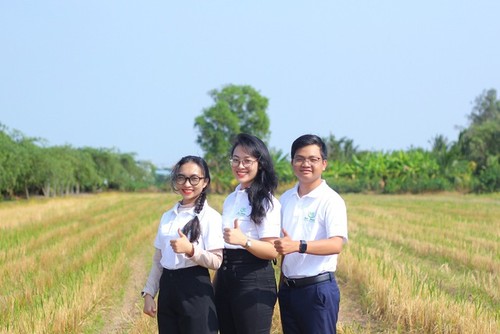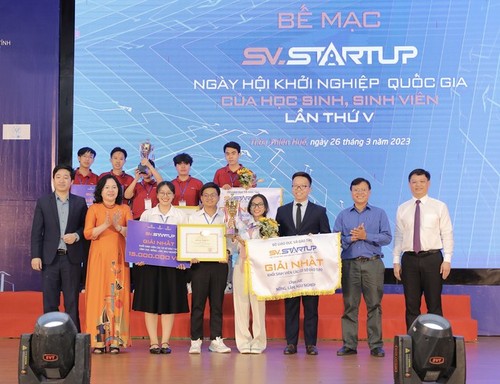 The members of the Eco House project (Photo credit: Industrial University of Ho Chi Minh City) The members of the Eco House project (Photo credit: Industrial University of Ho Chi Minh City)
|
ECO-HOUSE won first prize at the fifth student contest for startup ideas organized this year by the Ministry of Education and Training.
ECO-HOUSE was begun by three students - Ho Thanh Huy, the project’s leader, a fourth-year student of the Electronics Technology Faculty, Le Hoang Minh Chau, a fourth-year student of the Business Administration Faculty, and Tran Thi Tram, a third-year student of the Commerce and Tourism Faculty - under the guidance of lecturer Thai Duy Tung of the Finance and Banking Faculty.
The group's product is a small device installed in the garden, integrated with remote control software on smartphones to monitor and control important indicators such as temperature, humidity, water flow, and nutrient content in soil, N-P-K content, and pH.
The technology recognizes abnormal conditions and proactively warns the farmer. This minimizes risks, responds to climate change, improves productivity, and conserves water and power.
Ho Thanh Huy, the project’s team leader, learned through surveys that farmers are being introduced to products of unknown origin which are not user-friendly.
In response, the group has designed a product with simple and easy-to-use operation, helping farmers improve the value of their products.
Huy recalled although they were born and raised in the Mekong Delta and have never done farm work, they understand the difficulties and hardships of farmers and know how they work.
"We also have friends studying agriculture who are ready to support us to create products to help farmers. We want to look for opportunities right in our hometowns,” said Huy.
Based on IoT (Internet of Things) with a variety of options and crop cultivation logs, ECO-HOUSE helps farmers monitor the watering and supply of nutrients for plants. The system matches the financial condition and need of each garden.
 The authors of the Eco House project at the National Startup Festival for Students (Photo credit: Industrial University of Ho Chi Minh City) The authors of the Eco House project at the National Startup Festival for Students (Photo credit: Industrial University of Ho Chi Minh City)
|
Le Hoang Minh Chau, a team member, said the project targets farmers and cooperatives and is being piloted in several durian, apple, and pomelo orchards in Tien Giang and Ben Tre province, and at an orchid farm in Vung Tau.
“Farmers are still concerned although they are already aware of the usefulness of the device. They are hesitant to switch from conventional farming to smart farming. That’s why we’ve come up with new solutions based on conventional farming habits instead of getting rid of all the old ones,” said Chau.
The ECO-HOUSE device also helps consumers understand the cultivation process, where the products are grown, the soil content, or whether there are chemical residues in the soil, thereby increasing the value of Vietnamese agricultural products, Huy said.
He told VOV that they hope they’ll be successful and the market will accept the products.”
Through the project, the team wants to generate revenue from different sources - providing design consultancy, solutions for harvesting farm produce and making biological products for agriculture, in addition to the ECO-HOUSE device.
Tran Thi Tram, another member of the project, said she hopes their device will not only be used widely in Vietnam, but will also be exported.
“In addition to helping farmers sell safe agricultural products and improving their product value, we are trying to add more features to ECO-HOUSE, so that it can meet international standards and then be exported to many countries,” Tram noted.
Dr. Nguyen Quoc Cuong, Vice Dean of the Commerce and Tourism Faculty of the Industrial University of Ho Chi Minh City, said Vietnam has stepped up the development of a digital agricultural platform ecosystem.
Projects like ECO-HOUSE will help the domestic agricultural sector create new values, cut costs, reduce environmental impact, and increase the quality of farm produce, profits, and consumer satisfaction.
ECO-HOUSE was a very practical aid to help farmers improve cultivation in their local areas and contribute to protecting the environment and minimizing the use of fertilizers and pesticides, said Mr. Cuong.
Cuong added that the faculty pledged to provide advice to the students on turning this project into a spin-off business that exploits and commercializes current university research, and benefits the community, especially the high-tech agricultural community.
What makes the ECO-HOUSE project different from others is that the students have personally tested the model on various samples of land and learned farmers’ needs and farming practices. The product has received great support from both the university and the farmers.